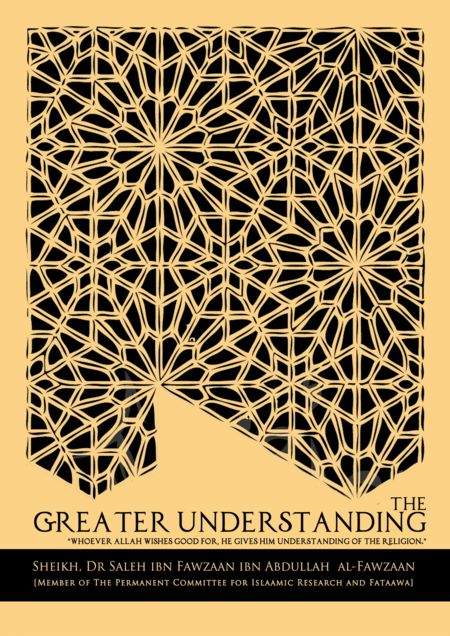Info about book (56 pages) taken from back cover:
About the Book: He who does not seek to understand Allah’s Religion, neither giving it any importance nor striving to seek knowledge, is an individual who has been been deprived from much good. This is because it is impossible for an individual to truly worship Allah, upon the true meaning of His worship, in the manner that is pleasing to Him, except by understanding His Religion and by performing acts of worship in the manner Allah has legislated. Likewise, it is impossible for an individual to perform acts of worship in the legislated manner except by seeking understanding of Allah’s Religion. As a result, it is impossible for the actions of one who performs deeds and worships Allah without understanding to be firmly established upon a correct foundation, and it is likely that all, if not most of his actions are misguidance. So based on this, we recognise the importance of understanding Allah’s Religion, that it is an issue of vital importance, and that it is required of a Muslim to attain understanding of Allah’s Religion, rather than remaining upon ignorance and error by not knowing how to worship Allah, or how to practice the obligations which Allah has made binding upon him.
About the Author: He is the virtuous Sheikh and Doctor Saleh ibn Fawzaan ibn Abdullah from the family of al-Fawzaan from the people of ash-Shamseeyah, from the tribe of Dawaa’seer. He was born in the year 1354 A.H. He completed his primary studies at the Faysaliyaah School in Buraydah 1371 A.H. Sheikh Saleh al-Fawzaan joined the faculty of Shar’eeah in Riyadh and graduated in the year 1381 A.H. He then received a Master’s degree in Jurisprudence, followed by a PHD specializing in Jurisprudence from the same faculty. After graduating from the Faculty of Sharee’ah, he was appointed as a teacher within an educational institute in Riyadh, and then transferred to a teaching position at the Faculty of Shar’iah. Sheikh Saleh al-Fawzaan later became a member of the Permanent Committee for Research and Verdicts, a position which he holds to this day.
The Worship of Allah is not Correct Except by Abandoning that which is Worshipped besides Him
Allah (subhaanuahu wa ta’aala) says:
“Worship Allah Alone, and keep away from Taghut.”
[an-Nahl (16):36]
And He (subhaanuahu wa ta’aala) says:
“Worship Allah alone and do not associate others in worship with him.” [an-Nisaa (4):36]
Allah did not restrict His statement to:
“Worship Allah alone.”
But rather He continued by saying:
“And do not associate others in worship with Him.”
[an-Nisaa (4):36]
This is because there is no benefit in any act of worship except and unless it is free from shirk.
As He (subhaanuahu wa ta’aala) says:
“So whoever hopes in the meeting with his Lord then let him do righteous actions, and he should not associate anything in worship with his Lord.” [al-Kahf (18):110]
Furthermore, Allah (subhaanuahu wa ta’aala) did not restrict His statement to:
“Let him do righteous actions,”
[al-Kahf (18):110]
On the contrary, He prohibited Shirk. Since a person may perform righteous actions yet corrupt them by committing shirk with Allah (subhaanuahu wa ta’aala). Thus, his actions become like scattered atoms and he does not benefit from them in the slightest, for righteous actions do not bring about any benefit unless they are free of shirk.
Therefore, this great danger requires us to gain understanding of shirk; both of the definition of shirk and its diffrent categories so that we may avoid and distance ourselves from it. It is through this that we may safeguard our worship and Religion purely for Allah (subhaanuahu wa ta’aala). Indeed many people think that shirk occurs only in Allah’s Lordship, thus they become lenient in this affair.
Meanwhile, they consider the study of at-Tawheed, the correct belief and the call to the pure worship of Allah to be something which causes separation between people. Hence they say: “we desire to unite the people.” In return, we say to them: “unity is not attained except by at-Tawheed.” As for unity that is built upon other than at-Tawheed, then there is no good in it and no benefit emanates from it and its result is enmity and destruction.
Allah, (subhaanuahu wa ta’aala), says:
“Who is more astray than he who invokes others besides Allah, they will not answer him until the Day of Resurrection, and are unaware of their calls, and on the Day when man will be gathered they will become enemies and will deny that which they worshipped.” [al-Ahqaf (46):5-6]
He, (subhaanuahu wa ta’aala) says:
“Friends on that Day will become enemies one to another except those who fear Allah. (It will be said to the true believers): ‘My worshippers! No fear shall be on you this Day, nor shall you grieve. (You) who believed in Our signs and were Muslims.'” [az-Zakhruf (43):67-69]
Thus, fruitful unity does not arise except through correct belief, and as a result, it is upon us to attain knowledge of the correct belief and call to it continuously. We must study it, inquire after it and teach it in our schools, centres and colleges, because it is the foundation of the Religion and the greater understanding.
Source: The Greater Understanding. Sheikh Dr Saleh Ibn Fawzaan Ibn Abdullaah Al-Fawzaan, DuSunnah Publication – Masjid Daar us-Sunnah, Translated by Abdullah Hylton, pp.24-28.



It is interesting to have a tip of teachings from other scholars.Thanks